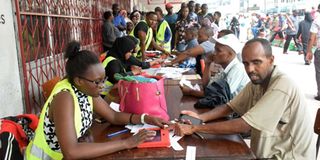Six-year-olds to get IDs in Huduma plan

Huduma Namba registration clerks attend to Mombasa residents in the Mombasa city centre on May 25, 2019.
What you need to know:
- The Minor’s Huduma Cards will be capped at below age 18 and will contain a child’s unique identifier, in this case a number.
- Children born after the roll-out of the project will get a unique number at birth.
Currently, the government is in the process of matching the collected data with existing databases to ascertain the validity of the new registry.
For the first time, children aged six years and above will have identity cards known as a Minor’s Huduma Card. The smart card will be printed by the government and issued starting this year as the government embarks on the mass distribution of Huduma smart cards under the National Integrated Identity Management System (NIIMS) programme.
Interior PS Karanja Kibicho said six-year-olds will get the cards because that is the age when a child’s facial biometrics are formed enough to be captured.
The Minor’s Huduma Cards will be capped at below age 18 and will contain a child’s unique identifier, in this case a number. Children born after the roll-out of the project will get a unique number at birth.
They will use the number when registering in school, getting a Minor’s card, and even when applying for the national identity card. That mean they will be identified with the number for the rest of their lives — and even beyond that as the number will also be on their death certificates.
“When you are born you get a birth notification, after which a birth certificate with a number is generated. Then at the age of six; you go to school where the Ministry of Education will want to register you under the National Education Management Information System (Nemis) and give you a Nemis number. Who said the numerals cannot match the ones you got at birth? ” posed Dr Kibicho.
Huduma cards
Foreigners and refugees will get different Huduma cards that will allow them access to services offered by the government. Under this programme, Kenyans may find themselves using their Huduma numbers to not only access government services, but also make calls and do other businesses as it will be tied to other key services to curb crime.
“Who said that the ID number cannot be the same number on your driving license? Some countries have gone as far as having their citizens’ phone numbers match this unique identifier,” said Dr Kibicho while updating the National Assembly’s Committee on Delegated Legisla-tion on the progress of the Huduma Namba project.
Despite collecting data from 37 million Kenyans last year, the government has not been able to make use of the information to process Huduma cards due to court cases challenging the safety of the data.
However, Dr Kibicho said the suits have since been determined and the process of issuing of cards is back on track, and that Kenyans will start receiving them before the end of the year.
“Those matters were heard and determined and as a result of the rulings, some requisite things have to be done; one is the development and gazettement of the regulations that we are putting before you and the second is the recruitment of some key personnel who will be able to deal with both the registration and data protection,” the PS told the committee.
Currently, the government is in the process of matching the collected data with existing databases to ascertain the validity of the new registry.
“What we have in our records must match what is in the database 100 per cent for us to be sure that the person who presented him- or her-self before us is the person we shall admit as a Kenyan. There are 90 fingerprints experts working on this and so far about 14 million of the 37 million data sets have been cleaned up,” said the PS.
Personal data
He assured Kenyans that the card only captures an individual’s personal data, which will be stored safely in the government’s database. The adult Huduma card will be a one-stop document containing a unique identifier and a chip containing the details of one’s KRA PIN, driving licence, birth certificate entry number, NHIF, NSSF and passport numbers. It will be issued free of charge within 30 days of application and Kenyans will be allowed to update it when, for example, they change their names or religion. Those who lose their cards will be required to pay a small fee to have them replaced. The fee is, however, yet to be gazetted.
Dr Kibicho said the Huduma number was brought about by the need to clean up the existing databases that had been infiltrated by persons through creation of fake IDs, besides having a digital database for all Kenyans, refugees and foreigners living in the country.
Gilgil MP Martha Wangari called on the government to open up more registration offices across the country to make acquisition of the mandatory document easier and faster. She noted that the country’s 366 sub-counties are only served by 119 civil registration offices.





